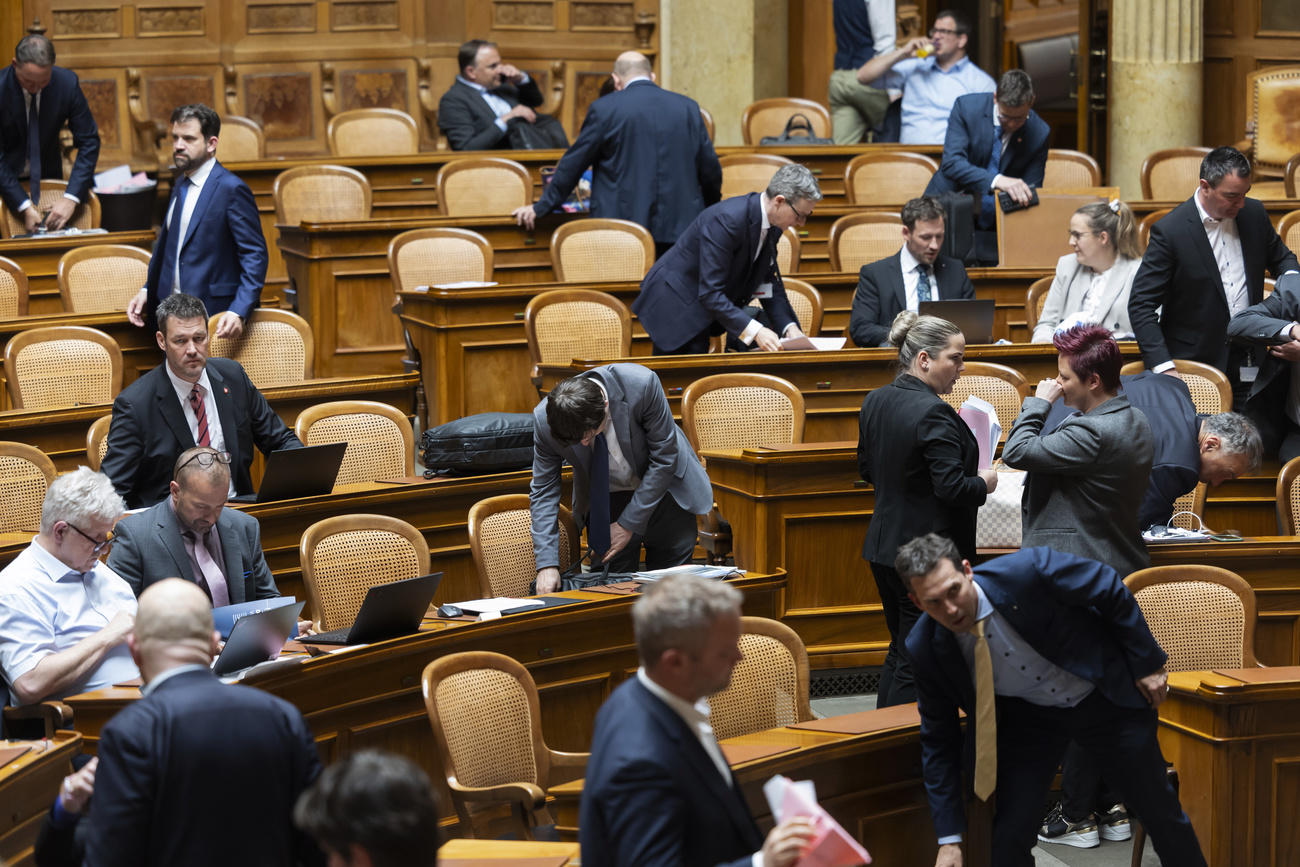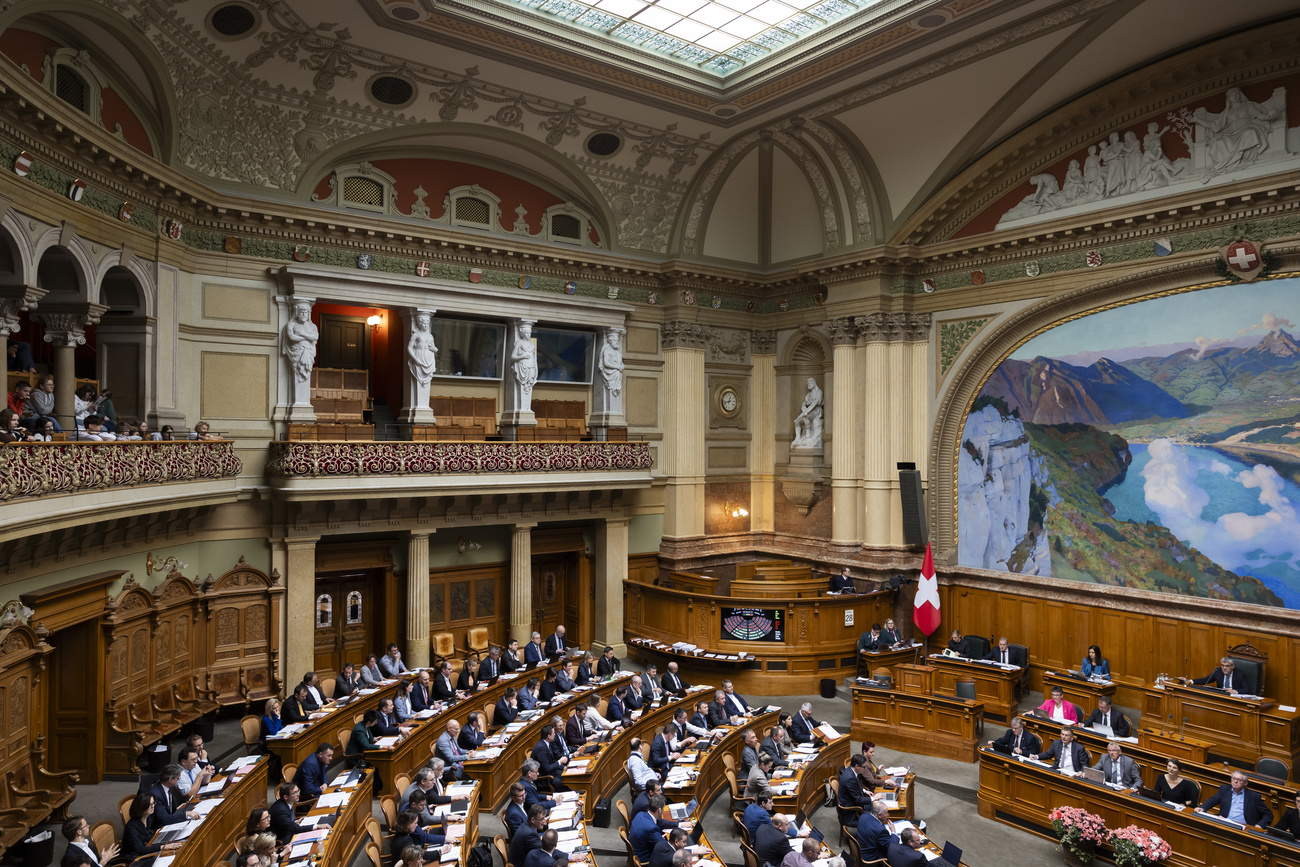
Social security takes centre stage in Swiss parliamentary debates

The abolition of children’s pensions, the export of extraordinary invalidity pensions and the right to family reunification: parliamentarians will be debating a number of subjects that closely affect the Swiss Abroad during the summer session, which takes place in Bern from May 27 to June 14.
Check out our selection of newsletters. Subscribe here.
The political battle to finance the 13th pension payment, which was approved in a referendum on March 3, is in full swing.
The right-wing Swiss People’s Party is determined to limit spending on the pension system in other areas. The country’s largest party is specifically targeting pensions paid to pensioners (mainly men) with young children or children in education living abroad.
During the summer session, the House of Representatives will vote on two motions put forward by People’s Party parliamentarian Andreas Glarner, which propose denouncing and renegotiating social security agreements with several countries to exclude the payment of children’s pensions. These include Thailand, the Philippines, Turkey, Brazil, the Dominican Republic and the countries of the former Yugoslavia.
Children’s pensions have already been put on hold, as the House of Representatives decided to abolish them altogether during the spring session. This decision has yet to be confirmed by the Senate.
All in all, these allowances cost the government around CHF230 million ($250 million) a year, which is only a small proportion of the sums paid out by the pension system (almost CHF50 billion in total). However, over the past few decades, the number of recipients has risen sharply, particularly outside Switzerland. Today, around 32,000 people receive this assistance, a third of whom live abroad.
Glarner believes that this situation often leads to abuse. “These regulations allow some expatriates to finance their lives abroad. Beneficiaries living abroad recognise children in the country as their own in order to obtain benefits,” he says.
However, the government is recommending the House of Representatives reject the motion. It points out that the conditions for entitlement to a pension are already subject to detailed and rigorous scrutiny to prevent abuse. Furthermore, in the government’s view, it would be disproportionate to denounce the agreements, and this would not achieve the objective of the motions.
>> Abolishing children’s pensions would have an impact on the diaspora:

More
Child pensions set to be abolished – in Switzerland and abroad
People receiving Swiss pensions are also the subject of a motion that will be discussed by the Senate. Beat Rieder from the Centre Party is calling on the government to increase pension pensions for those in need. However, the motion was tabled before the popular vote in favour of a 13th pension payment and should therefore be buried quickly.
Obstacle to mobility or safeguard?
The House of Representatives will also be debating extraordinary invalidity pensions. These are paid to people who have been disabled since birth or before the age of 20. These people have not been able to contribute to the Invalidity Insurance for three years, the minimum required to be entitled to an ordinary pension, but can receive an extraordinary pension in the form of a fixed amount.
However, the law prohibits the payment of these pensions abroad. In principle, recipients of these pensions are obliged to remain domiciled in Switzerland if they wish to continue receiving a sum on which they often depend for their livelihood.
Barbara Gysi from the left-wing Social Democratic Party considers the situation to be unfair. “This can give rise to dramatic cases, for example when Swiss citizens in receipt of an extraordinary invalidity pension wish to move to another country but can only do so if they continue to receive their pension,” she writes in a motion, which calls on the government to allow extraordinary disability pensions to be exported.
The Organisation of the Swiss Abroad (OSA) supports the motion, believing that the current situation constitutes an obstacle to international mobility that must be eliminated. However, the government is opposed to the motion. Without a ban on the export of these benefits, it believes people could be tempted to enter Switzerland for the sole purpose of obtaining a pension.

More
Newsletters
Swiss discriminated against at home
Parliamentarians will also be voting on discrimination against Swiss nationals in their own country, which we reported on here.
Swiss nationals abroad who decide to return home with family members do not enjoy the same rights as citizens of the European Union and EFTA (European Free Trade Association) countries when it comes to family reunification.
This means, for example, that an EU citizen resident in Switzerland and married to a third-country national can bring their parents-in-law to Switzerland. However, this right is not granted to a Swiss person in the same situation.
A parliamentary initiative by former Social Democrat parliamentarian Angelo Barrile aims to put an end to this difference in treatment. The government is in favour, as is the OSA.
Tax issues
The Senate still has to approve an amendment to the double taxation agreement with France, which has already been accepted by the House of Representatives.
This amendment is extremely important, as it will mainly regulate the taxation of cross-border commuters working from home. Under an agreement between Bern and Paris, cross-border commuters are required to pay withholding tax in Switzerland on their entire salary, provided that they do not do more than 40% of their annual workload from home.
The senators are also expected to approve an agreement between Switzerland and Slovenia to avoid double taxation. The project has already passed through the House of Representatives and has satisfied the business community.
Translated from French by DeepL/ts

More
How are you? What is on your mind? Take part in our big survey

In compliance with the JTI standards
More: SWI swissinfo.ch certified by the Journalism Trust Initiative


























You can find an overview of ongoing debates with our journalists here . Please join us!
If you want to start a conversation about a topic raised in this article or want to report factual errors, email us at english@swissinfo.ch.